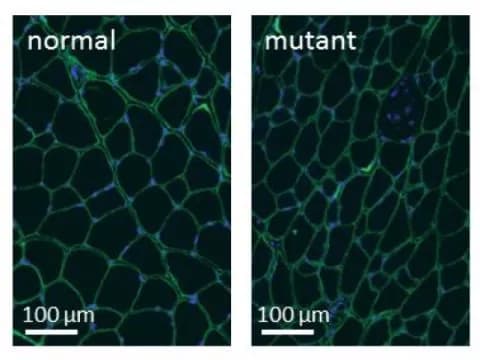
Placenta In Females, Muscle Mass In Males: Dual Heritage Of A Virus
It was already known that genes inherited from ancient retroviruses[1] are essential to the placenta in mammals, a finding to which scientists in the Laboratoire Physiologie et Pathologie Moléculaires des Rétrovirus Endogènes et Infectieux (CNRS/Université Paris-Sud) contributed. Today, the same scientists[2] have revealed a new chapter in this astonishing story: these genes of viral origin may also be responsible for the more developed muscle mass seen in males! Their findings are published on 2 September 2016 in PLOS Genetics.
Retroviruses carry proteins on their surface that are able to mediate fusion of their envelope with the membrane of a target cell. Once released inside that cell, their genetic material becomes integrated in the host's chromosomes. In the rare cases where the infected cell is involved in reproduction, the viral genes may be transmitted to progeny. Thus nearly 8% of the mammalian genome is made up of vestiges of retroviruses, or "endogenous" retroviruses. Most of them are inactive, but some remain capable of producing proteins: this is the case of syncytins, proteins that are present in all mammals and encoded by genes inherited from retroviruses "captured" by their ancestors. A little more than five years ago, and thanks to inactivation of these genes in mice, the team led by Thierry Heidmann demonstrated that syncytins contribute to formation of the placenta. Because of their ancestral ability to mediate cell-cell fusion they give rise to the syncytiotrophoblast[3], a tissue formed by the fusion of a large number of cells derived from the embryo, at the fetomaternal interface.
Using the same mice, the team has revealed a "collateral" and unexpected effect of these proteins: they endow males with more muscle mass than females! Like the syncytiotrophoblast, muscle mass develops from fused stem cells. In the genetically-modified male mice, these fibers were 20% smaller and displayed 20% fewer nuclei than in standard males; they were then similar to those seen in females, as was their total muscle mass. It therefore appears that the inactivation of syncytins leads to a fusion deficit during muscle growth, but only in males. The scientists observed the same phenomenon in the case of muscle regeneration following a lesion: the male mice incapable of producing syncytins experienced less effective regeneration than the other males, but it was comparable to that seen in females. Furthermore, the regenerating muscle fibers produced syncytin -- once again, only in males.
If this discovery were to be confirmed in other mammals, it might account for the muscle dimorphism observed between males and females, a difference that is not seen so systematically in egg laying animals. By cultivating muscle stem cells from different mammalian species (mouse, sheep, dog, human), the scientists have advanced some way along the path: they indeed showed that syncytins contributed to the formation of muscle fibers in all the species tested. It is now necessary to demonstrate whether, in these species as well, the action of syncytins is also male-specific.
[1] The particular feature of retroviruses is that they possess an enzyme that permits transcription of their RNA genome in a "complementary" DNA molecule which is able to integrate in the DNA of the host cell. The AIDS virus (HIV) is the best known example of a retrovirus.
[2] In collaboration with colleagues working on muscles: the teams led by Julie Dumonceaux at the Centre de Recherche en Myologie (CNRS/UPMC/Inserm) and Laurent Tiret at the École Nationale Vétérinaire d'Alfort and the Institut Mondor de Recherche Biomédicale (Inserm/UPEC).
[3] The syncytiotrophoblast is part of the placenta that permits implantation in the uterus and then constitutes the interface between the maternal bloodstream and that of the embryo, where the exchanges of gases and nutrients necessary for the latter's development occur.
The above post is reprinted from materials provided by CNRS. Note: Content may be edited for style and length.
Disclaimer: DoveMed is not responsible for the adapted accuracy of news releases posted to DoveMed by contributing universities and institutions.
Primary Resource:
Redelsperger, F., Raddi, N., Bacquin, A., Vernochet, C., Mariot, V., Gache, V., ... & Dupressoir, A. (2016). Genetic Evidence That Captured Retroviral Envelope syncytins Contribute to Myoblast Fusion and Muscle Sexual Dimorphism in Mice. PLoS Genet, 12(9), e1006289.
Related Articles
Test Your Knowledge
Asked by users
Related Centers
Related Specialties
Related Physicians
Related Procedures
Related Resources
Join DoveHubs
and connect with fellow professionals

0 Comments
Please log in to post a comment.